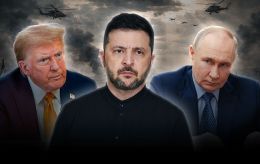US, South Korea, and Japan create group to monitor sanctions against North Korea
 Western countries monitor the enforcement of sanctions against North Korea (photo from open sources)
Western countries monitor the enforcement of sanctions against North Korea (photo from open sources)
The US, South Korea, and Japan have announced the establishment of a new multinational group to monitor the enforcement of sanctions against North Korea. The decision comes in the wake of Russia and China disrupting UN monitoring activities, reports Reuters.
The mechanism, named the Multilateral Sanctions Monitoring Team, was established in March this year. This followed Moscow's rejection of the annual update of the UN expert group, which had monitored compliance with sanctions aimed at curbing North Korea's nuclear and missile programs for the past 15 years. At that time, China abstained from voting.
According to a South Korean official, this new group will continue the work of the UN group, including preparing regular reports on sanctions compliance. It will involve eight additional countries, including the UK, France, and Germany.
The launch of the group was announced at a joint press conference in Seoul on October 16 by US Deputy Secretary of State Kurt Campbell, South Korean Vice Foreign Minister Kim Hong-kyun, and Japan's Vice Foreign Minister Masataka Okano, along with ambassadors from the eight countries ahead of their negotiations in Seoul.
"There have been many discussions about how to build an effective monitoring system that can replace the UN panel, but even during that process, cases of North Korea violating sanctions continued to occur, so we thought that we should not delay any longer and should quickly fill the gap," Kim stated.
He added that while the allies will continue to seek ways to restore the UN framework, the team is open to all countries willing to assist in ensuring compliance with sanctions.
According to Campbell, Russia's veto was likely influenced by a previous report from the UN expert group regarding North Korea's illegal procurement of military equipment and ammunition for the war in Ukraine.
"The potential for this to be a major effort in tracking and holding to account steps that North Korea is taking across a range of provocative actions is real. So this is a big step in the right direction," Campbell said.
Washington and Seoul assert that North Korea and Russia are engaged in illegal military operations. Moscow and Pyongyang deny any arms transfer but have promised to strengthen military ties, signing a mutual defense agreement at a summit in June.
The new initiative is likely to lack the international legitimacy afforded to UN-backed operations. However, it could provide more effective monitoring of North Korea, free from attempts by Moscow and Beijing to downplay suspicions of Pyongyang's evasion of sanctions within the global organization, believes Ethan Hee-seok Shin, a legal analyst at the Seoul-based Transitional Justice Working Group.
"Going forward, the like-minded governments should also consider utilising the sanctions to target the individuals and entities in North Korea and elsewhere that enable Pyongyang to commit grave human rights violations," Shin stated.
Western sanctions against North Korea
In December 2023, the White House announced that North Korea had sold a shipment of ballistic missiles to Russia. Subsequently, Russia used these missiles to strike Ukrainian territory.
Several Western countries condemned this cooperation and began imposing sanctions on North Korea for its collaboration with Russia.
In May, the UK imposed sanctions on companies engaged in arms trading in exchange for oil between Russia and North Korea.
Japan also implemented restrictions against Pyongyang.
Later, South Korea enacted sanctions against Russian ships transporting weapons from North Korea.

